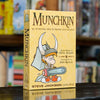
Munchkin: Slaying Monsters and Betraying Friends with a Smile
, by Jack Jones, 3 min reading time

, by Jack Jones, 3 min reading time
Munchkin, the card game that turns traditional dungeon crawling on its head, has been a staple in the world of tabletop gaming since its inception. Created by Steve Jackson and illustrated by John Kovalic, Munchkin captures the essence of a fantasy adventure but with a whimsical, often hilarious twist. This blog post will explore the mechanics of Munchkin, its appeal across various player demographics, and the reasons for its enduring popularity.
Munchkin is a game that is easy to learn but offers a depth of strategy that keeps players engaged. The game starts with players assuming the role of a character, each striving to reach Level 10 by slaying monsters, equipping themselves with absurdly named gear, and navigating through treacherous curses and hilarious setbacks.
The core mechanics revolve around the 'kick down the door' phase, where players draw a card that could either be a monster to fight or a curse to suffer. Combat is straightforward – your character’s level plus any bonuses from equipped items must exceed the monster's level. Allies can help in combat, often for a price, but beware, as other players can throw obstacles in your way, making monsters tougher to beat.
One of the most engaging aspects of Munchkin is the ability to betray your friends. In the spirit of competitive fun, players often form and dissolve alliances, all in the pursuit of reaching Level 10 first. This dynamic creates an atmosphere of playful treachery, filled with laughter and occasional mock outrage.
Munchkin's appeal lies in its ability to cater to a wide range of players. For seasoned gamers, the strategic depth, especially in managing resources and timing your moves, offers a satisfying challenge. For casual players, the game is an easy gateway into the world of role-playing games without the complexity often associated with the genre.
The game's humor is a significant draw. The card descriptions, monster names, and the playful art by John Kovalic add a layer of enjoyment that transcends the basic mechanics of the game. This humor keeps the atmosphere light, even when competition heats up, making it a great choice for social gatherings and parties.
Furthermore, Munchkin's flexibility in player numbers (typically 3-6 players) makes it suitable for various group sizes. Its relatively short playtime (about an hour) means it can be enjoyed even on a weeknight, making it a versatile addition to any game night.
Munchkin has not only stood the test of time but has also expanded into a vast franchise, with numerous expansions and themed editions. From 'Munchkin Cthulhu' to 'Munchkin Zombies,' each version offers unique twists while maintaining the core mechanics that fans love. These expansions keep the game fresh and offer players new realms to explore.
The game's enduring popularity can also be attributed to its community. Players have formed a dedicated fan base, sharing strategies, hosting themed game nights, and even participating in tournaments. The game has also made a significant impact on pop culture, referenced in various media and beloved by a diverse audience.
Munchkin is more than just a card game. It's an adventure filled with laughter, strategy, and the occasional backstabbing. Its blend of simple mechanics, engaging gameplay, and irreverent humor makes it a standout in the world of tabletop games. Whether you're a hardcore gamer or just looking for a fun way to spend an evening with friends, Munchkin offers an experience that is both unique and immensely enjoyable. So, gather your friends, draw your swords, and get ready to embark on a journey filled with monsters, treasures, and most importantly, fun!